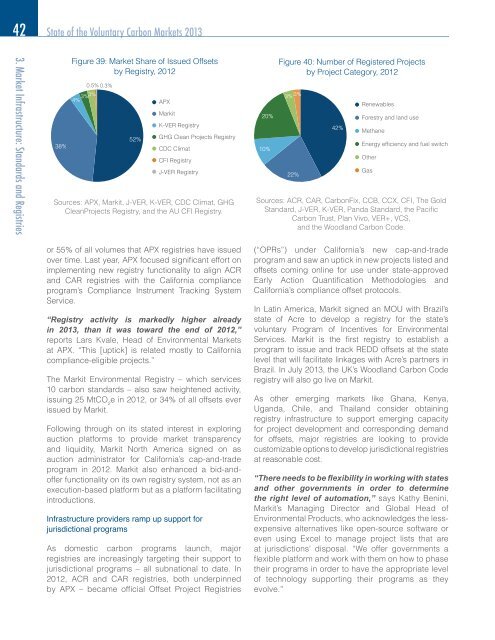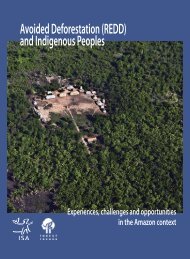Maneuvering the Mosaic: Full Report - Forest Trends
Maneuvering the Mosaic: Full Report - Forest Trends
Maneuvering the Mosaic: Full Report - Forest Trends
You also want an ePaper? Increase the reach of your titles
YUMPU automatically turns print PDFs into web optimized ePapers that Google loves.
42 State of <strong>the</strong> Voluntary Carbon Markets 2013<br />
3. Market Infrastructure: Standards and Registries<br />
38%<br />
Figure 39: Market Share of Issued Offsets<br />
by Registry, 2012<br />
0.5% 0.3%<br />
3% 3%<br />
4%<br />
52%<br />
APX<br />
Markit<br />
K-VER Registry<br />
GHG Clean Projects Registry<br />
CDC Climat<br />
CFI Registry<br />
J-VER Registry<br />
Sources: APX, Markit, J-VER, K-VER, CDC Climat, GHG<br />
CleanProjects Registry, and <strong>the</strong> AU CFI Registry.<br />
or 55% of all volumes that APX registries have issued<br />
over time. Last year, APX focused signifi cant effort on<br />
implementing new registry functionality to align ACR<br />
and CAR registries with <strong>the</strong> California compliance<br />
program’s Compliance Instrument Tracking System<br />
Service.<br />
“Registry activity is markedly higher already<br />
in 2013, than it was toward <strong>the</strong> end of 2012,”<br />
reports Lars Kvale, Head of Environmental Markets<br />
at APX. “This [uptick] is related mostly to California<br />
compliance-eligible projects.”<br />
The Markit Environmental Registry – which services<br />
10 carbon standards – also saw heightened activity,<br />
issuing 25 MtCO 2 e in 2012, or 34% of all offsets ever<br />
issued by Markit.<br />
Following through on its stated interest in exploring<br />
auction platforms to provide market transparency<br />
and liquidity, Markit North America signed on as<br />
auction administrator for California’s cap-and-trade<br />
program in 2012. Markit also enhanced a bid-andoffer<br />
functionality on its own registry system, not as an<br />
execution-based platform but as a platform facilitating<br />
introductions.<br />
Infrastructure providers ramp up support for<br />
jurisdictional programs<br />
As domestic carbon programs launch, major<br />
registries are increasingly targeting <strong>the</strong>ir support to<br />
jurisdictional programs – all subnational to date. In<br />
2012, ACR and CAR registries, both underpinned<br />
by APX – became offi cial Offset Project Registries<br />
20%<br />
10%<br />
Figure 40: Number of Registered Projects<br />
by Project Category, 2012<br />
3% 3%<br />
22%<br />
42%<br />
Renewables<br />
<strong>Forest</strong>ry and land use<br />
Methane<br />
Energy efficiency and fuel switch<br />
O<strong>the</strong>r<br />
Gas<br />
Sources: ACR, CAR, CarbonFix, CCB, CCX, CFI, The Gold<br />
Standard, J-VER, K-VER, Panda Standard, <strong>the</strong> Pacifi c<br />
Carbon Trust, Plan Vivo, VER+, VCS,<br />
and <strong>the</strong> Woodland Carbon Code.<br />
(“OPRs”) under California’s new cap-and-trade<br />
program and saw an uptick in new projects listed and<br />
offsets coming online for use under state-approved<br />
Early Action Quantifi cation Methodologies and<br />
California’s compliance offset protocols.<br />
In Latin America, Markit signed an MOU with Brazil’s<br />
state of Acre to develop a registry for <strong>the</strong> state’s<br />
voluntary Program of Incentives for Environmental<br />
Services. Markit is <strong>the</strong> fi rst registry to establish a<br />
program to issue and track REDD offsets at <strong>the</strong> state<br />
level that will facilitate linkages with Acre’s partners in<br />
Brazil. In July 2013, <strong>the</strong> UK’s Woodland Carbon Code<br />
registry will also go live on Markit.<br />
As o<strong>the</strong>r emerging markets like Ghana, Kenya,<br />
Uganda, Chile, and Thailand consider obtaining<br />
registry infrastructure to support emerging capacity<br />
for project development and corresponding demand<br />
for offsets, major registries are looking to provide<br />
customizable options to develop jurisdictional registries<br />
at reasonable cost.<br />
“There needs to be fl exibility in working with states<br />
and o<strong>the</strong>r governments in order to determine<br />
<strong>the</strong> right level of automation,” says Kathy Benini,<br />
Markit’s Managing Director and Global Head of<br />
Environmental Products, who acknowledges <strong>the</strong> lessexpensive<br />
alternatives like open-source software or<br />
even using Excel to manage project lists that are<br />
at jurisdictions’ disposal. “We offer governments a<br />
fl exible platform and work with <strong>the</strong>m on how to phase<br />
<strong>the</strong>ir programs in order to have <strong>the</strong> appropriate level<br />
of technology supporting <strong>the</strong>ir programs as <strong>the</strong>y<br />
evolve.”
















